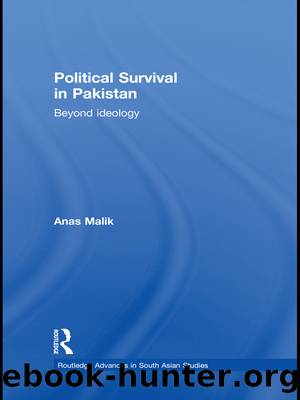Political Survival in Pakistan: Beyond Ideology by Anas Malik

Author:Anas Malik [Malik, Anas]
Language: eng
Format: epub
Tags: Ethnic Studies, Social Science, Political Science, Regional Studies, General
ISBN: 9781136904196
Google: dLkuCgAAQBAJ
Goodreads: 17583070
Publisher: Routledge
Published: 2010-10-01T00:00:00+00:00
Mujib had warned Bengalis that âan artificial crisis is being fabricated to sabotage the making of the constitutionâ (Ziring, 1997: 355). The Mukti Bahini in East Pakistan was supported by the Indian army and the 1970â71 internal war cost between 300,000 and 3,000,000 lives (Stewart and Hyat, 2002: 111). Pakistan had excluded the majority of the population, East Pakistanis, from membership in the winning coalition and the effective selectorate, producing a secessionist challenge. Mujib had ânear-sovereign control,â a solid quasi-state overlaid with the province that positioned East Pakistan well for a bid for full independence, which it achieved. His quasi-state came partly from obtaining control over government offices.
Yahya Khan used heavy Islamic symbolism in his address to the nation as the 1971 war with India unfolded: âThe Indian aggressors should know that they have to face twelve crore [120 million] Mujahids of Pakistan, imbued with the love of God and the Holy Prophet. The Indians know that in 1965, our brave forces had smashed them into pieces. But this time, God willing, we shall hit the enemy even harder than beforeâ (quoted in Nawaz, 2008: 298). Others picked up on this theme. An editorial in The Pakistan Times stated that âHe [Yahya] spoke in the name of Islam [â¦]. Overnight the ethos is deeply Islamic [â¦]. If crisis truly mirrors the condition and nature of a nation, today our character is transparently clear and no dust of controversy can blur its shining imageâ (quoted in Nawaz, 2008: 298). Yahya Khan sought legitimacy and unity by invoking religious symbolism. He used the evocative term âMujahid,â mentioned what is sacred and venerated, God and his Holy Prophet, and used a common term emphasizing oneâs faith when he said âGod willingâ to condition his assertion that the enemy would be hit harder than before. Thus he clearly sought to give the war an âIslamicâ frame. Yet the same frame would be severely strained by Bangladeshâs successful secession. The countryâs largest province had broken away despite claims that Pakistan was fighting an Islamically legitimate war. This showed that Muslim solidarity was not sufficient to prevent secession, and had an emboldening effect on othersâ particularly in the conscious choices by Sindhi political leader G.M. Syed, as well as the terms in which unrest in Balochistan was understood by observers, described below.
Download
This site does not store any files on its server. We only index and link to content provided by other sites. Please contact the content providers to delete copyright contents if any and email us, we'll remove relevant links or contents immediately.
Spell It Out by David Crystal(36019)
Life for Me Ain't Been No Crystal Stair by Susan Sheehan(35718)
Cecilia; Or, Memoirs of an Heiress — Volume 1 by Fanny Burney(32410)
Cecilia; Or, Memoirs of an Heiress — Volume 3 by Fanny Burney(31818)
Cecilia; Or, Memoirs of an Heiress — Volume 2 by Fanny Burney(31794)
The Great Music City by Andrea Baker(31248)
Professional Troublemaker by Luvvie Ajayi Jones(29570)
We're Going to Need More Wine by Gabrielle Union(18950)
The Secret History by Donna Tartt(18803)
Twilight of the Idols With the Antichrist and Ecce Homo by Friedrich Nietzsche(18473)
All the Missing Girls by Megan Miranda(15484)
Cat's cradle by Kurt Vonnegut(15145)
Pimp by Iceberg Slim(14311)
Bombshells: Glamour Girls of a Lifetime by Sullivan Steve(13949)
Talking to Strangers by Malcolm Gladwell(13183)
Norse Mythology by Gaiman Neil(13167)
Fifty Shades Freed by E L James(13143)
For the Love of Europe by Rick Steves(12605)
The Social Justice Warrior Handbook by Lisa De Pasquale(12125)
